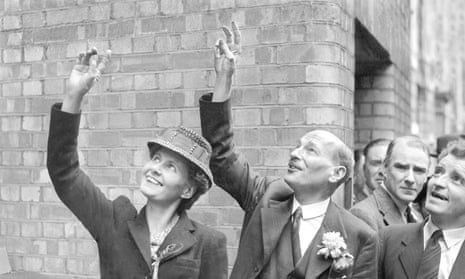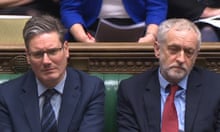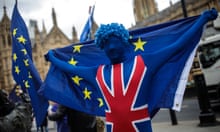On 5 July 1945, the British people “spoke”. Churchill had been a great war leader, but memories of the unemployment and penury of the interwar years were strong. Labour was elected by a resounding majority. On 23 February 1950, the Attlee government went to the country, and, again, the people “spoke”. The government was re-elected.
Although that immediate postwar Attlee government has been almost sanctified by modern historians, things were rough for it most of the time. The largely Conservative press attacked many of the social reforms that were subsequently accepted by the Tory party.
The going got even rougher for the second Attlee government, with a fatal split between the leftwing “Bevanites” and the mainstream of the Labour party. Within 20 months of the 1950 election, the beleaguered government found itself forced into calling another election.
Yes, on 25 October 1951, the people “spoke” again. This time they – or, rather, a sufficient number of them – had changed their minds. To repeat: within 18 months, the “will of the people” had altered.
Now, the referendum on our membership of the European Union took place on 23 June 2016. It is more then 18 months since that terrible day – time for a sufficient number of people to have changed their minds, and time for the predominantly Remain younger voters to appreciate the loss of freedom that would ensue if Brexit went ahead – and to resolve that, given another chance, this time more of them would vote.
Now, I did not get where I am today by making rash forecasts: but I was struck by the recent findings of one research organisation that there has been a modest movement in favour of Remain, and that analysis of demographic trends suggests this trend is likely to continue. No doubt this is one reason that the fanatical Brexiters seem prepared to see their “red lines” scratched out one by one in order to achieve their ultimate goal, which is Brexit at any cost.
And as Harry Eyres and George Myerson point out in their entertaining Johnson’s Brexit Dictionary – Or, An A to Z of What Brexit Really Means, for the Daily Mail and its slavish Brexiter followers the definition of “traitor” is “one who disagrees in any way with Brexit”. Sadly, to listen to the BBC you could be forgiven for thinking either that Brexit had already happened, or that it is 100% certain that it will. To which I say, as an admirer of the Roman poet Horace, nil desperandum.
It was obviously a mistake of the Remain campaign before the referendum to allow themselves to come across as threatening immediate gloom and doom – although they were right about the collapse of the pound, which has aggravated the squeeze on real incomes that was already apparent.
But if Brexit is allowed to go ahead, the implications of leaving the single market – one of Theresa May’s deranged commitments – will soon become apparent. Already there are reports of British companies planning to cut back workforces. And the Japanese, on whose investment in this country’s car and electronic industries the Thatcher governments depended for their putative “economic miracle”, have been dropping heavy hints about their plans for relocation to mainland Europe if Brexit goes ahead.
It is almost criminal that this government is preoccupied with obeying a snapshot “will of the people” protest vote when so many of those people are being hit by the impact of its continuing austerity. Every day now, one hears of the way the “cuts” are associated with rising crime, social distress, and hospitals that cannot cope. Only the other day the former health secretary, Andrew Lansley, complained that the cuts – that is, his former cabinet colleague George Osborne’s austerity programme – had delayed diagnosis of one of his own health problems.
How long will it be before the government – and, for that matter, the Labour party – realise that our EU partners mean what they say about attempts to cherry-pick? As my friend Sam, whom I often meet at the open-air cafe in Kenwood, London, declared the other day: “All the negotiators are doing at the moment is trying to achieve what we already have.”
The plain truth is that membership allowed us to cherry-pick. Leaving the club does not. Margaret Thatcher achieved the single market we wanted and we were exempted from joining the eurozone. Contrary to one of the many myths spread by the Brexiters, we also have a “get out of jail free” card when it comes to any move towards a closer political union. The best of both worlds.
Wake up, Theresa May. Europe needs us and we need Europe.










